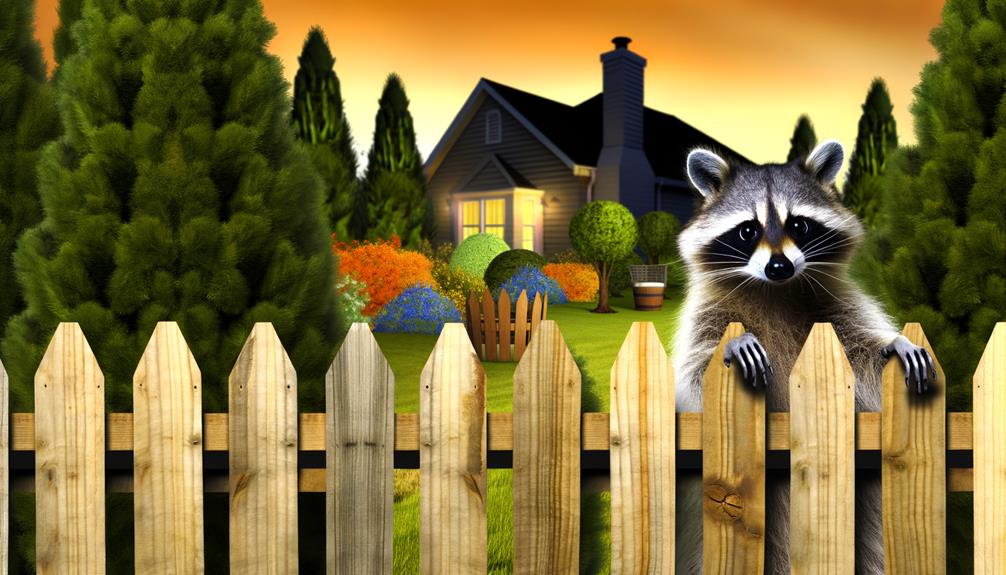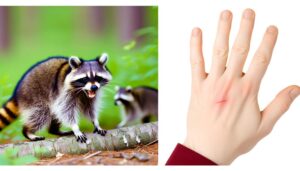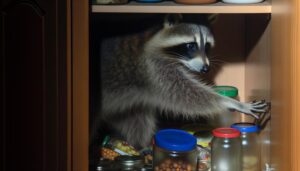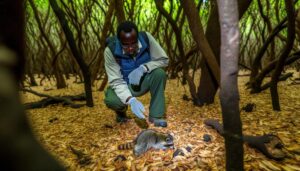Do You Need a License to Have a Pet Raccoon?
Yes, a license is generally needed to own a pet raccoon, varying widely by state and local regulations. Some states prohibit raccoon ownership entirely, while others permit it under specific conditions.
Obtaining a license typically involves demonstrating knowledge about raccoon care, providing suitable housing, and complying with veterinary requirements. You may need to register with wildlife authorities, complete training courses, and undergo facility inspections.
These measures safeguard the raccoon's welfare and public safety. Understanding the specific requirements and legal obligations in your area is essential.
Explore further to familiarize yourself with the detailed application process and additional considerations.

Key Takeaways
- Many states require a special wildlife permit to own a pet raccoon.
- Some states completely prohibit raccoon ownership regardless of permits.
- Licensing often involves proving adequate facilities and care plans for the raccoon.
- State-specific regulations may mandate registration with wildlife authorities.
- Background checks and veterinary inspections are commonly part of the licensing process.
Legal Requirements
To legally own a pet raccoon in many regions, prospective owners must comply with a variety of state and local regulations. These regulations are designed to guarantee the safety and well-being of both the animal and the public. Typically, this involves obtaining specific permits or licenses, which often require proof of adequate facilities and care plans for the raccoon.
Prospective owners may also need to demonstrate knowledge of raccoon behavior and health needs, and sometimes even complete a training course. Additionally, certain vaccinations or health certifications may be mandated. Compliance with these legal requirements not only satisfies regulatory obligations but also reflects a commitment to responsible pet ownership and the ethical treatment of wildlife.
State-by-State Regulations
Understanding the state-by-state regulations for owning a pet raccoon is vital, as each state has its own specific legal requirements and restrictions. These regulations can vary significantly, impacting whether it is permissible to have a raccoon as a pet.
For individuals seeking to responsibly care for a raccoon, familiarizing themselves with local laws is important to guarantee compliance and avoid potential legal issues. Notable variations include:
- Some states completely prohibit the ownership of raccoons as pets.
- Other states permit ownership but require specific conditions, such as enclosures and veterinary care.
- Certain states allow pet raccoons but mandate registration with local wildlife authorities.
- In some states, raccoon ownership is permitted only with a special wildlife permit.
Understanding these regulations helps ensure responsible pet ownership.
Necessary Permits
Obtaining the needed permits for owning a pet raccoon involves navigating a complex network of legal requirements that vary by state and may include special wildlife permits, registration, and compliance with specific care standards.
Typically, states mandate permits to guarantee raccoons are kept in environments that meet their physical and behavioral needs. These permits often require a detailed plan outlining proper housing, diet, and medical care.
Additionally, some states require periodic veterinary check-ups and might impose restrictions on breeding and sale. Adhering to these regulations is essential to ensure both the welfare of the raccoon and the safety of the public.
As a result, potential owners must thoroughly research their state's specific requirements to lawfully and ethically maintain a pet raccoon.
Application Process
Maneuvering the application process for a pet raccoon permit requires meticulous attention to detail and thorough preparation of all necessary documentation. Prospective raccoon owners must adhere to specific state and local regulations, which often involve several steps and stringent requirements. The initial stage typically includes gathering and submitting various forms and evidence to demonstrate suitability for raccoon ownership.
Key components of the application process may include:
- Proof of Residence: Documentation confirming your legal residence within the specific jurisdiction.
- Background Check: A detailed background check to verify no prior violations of animal welfare laws.
- Veterinary Inspection: Certification from a licensed veterinarian verifying the health and wellbeing of the raccoon.
- Facility Inspection: An on-site inspection of the living conditions to meet regulatory standards.
Diligence in following these steps can facilitate a smoother approval process.
Health and Safety Concerns
When considering the licensure of pet raccoons, health and safety concerns play an essential role, particularly regarding disease transmission risks and proper handling techniques.
Raccoons are known carriers of various zoonotic diseases, such as rabies and leptospirosis, which pose significant threats to both human and animal health.
It is essential that prospective raccoon owners are well-informed and trained in proper handling practices to mitigate these risks effectively.
Disease Transmission Risks
Raccoons, while often perceived as harmless pets, can be carriers of numerous diseases that pose significant health and safety risks to humans and other animals. These risks necessitate a thorough understanding and cautious approach to raccoon ownership.
The diseases raccoons can transmit include:
- Rabies: A fatal viral disease affecting the central nervous system, transmissible through bites or scratches.
- Leptospirosis: A bacterial infection spread through contact with raccoon urine, leading to severe liver and kidney damage.
- Baylisascaris procyonis: A parasitic roundworm causing neural larva migrans, potentially leading to severe neurological damage.
- Distemper: A highly contagious viral disease affecting respiratory, gastrointestinal, and nervous systems, deadly for both raccoons and domestic dogs.
Understanding these risks is essential for ensuring the health and safety of all involved.
Proper Handling Techniques
Implementing proper handling techniques is important for minimizing health and safety concerns associated with keeping pet raccoons.
First, always use protective gloves and long sleeves to prevent bites and scratches, as raccoons can carry zoonotic diseases. Regularly wash hands with soap and water after handling. Make sure that raccoons are vaccinated against common diseases like rabies.
Use appropriate restraint methods—never grasp a raccoon by the tail or scruff, as this can cause injury. Instead, support the animal's body weight. Socialize your raccoon early to reduce aggressive behaviors and guarantee a more manageable pet.
Additionally, maintain a clean living environment to minimize exposure to harmful pathogens. These measures are important for both the raccoon's wellbeing and human safety.
Ethical Considerations
The ethical considerations surrounding the licensing of pet raccoons encompass a range of issues including animal welfare, ecological impact, and public safety. Ensuring that raccoons are kept in environments that meet their complex needs is essential for their well-being.
Additionally, the potential for raccoons to disrupt local ecosystems if they escape poses significant ecological risks. Public safety is another concern, as raccoons can carry diseases transmissible to humans and other animals.
- Animal Welfare: Ensuring humane treatment and appropriate living conditions.
- Ecological Impact: Preventing ecological imbalances caused by escaped raccoons.
- Public Safety: Mitigating risks of zoonotic diseases.
- Ethical Responsibility: Upholding moral obligations to protect both the animals and the community.
Addressing these ethical considerations is vital for responsible ownership.
Alternatives to Raccoons
For those considering an exotic pet, exploring alternatives to raccoons can lead to the adoption of animals that may be more manageable and pose fewer ethical and ecological concerns.
Sugar gliders, for instance, are small marsupials that bond strongly with their owners and require less space.
Hedgehogs are another option, known for their low-maintenance care and charming personalities.
Ferrets, though slightly more demanding, offer playful companionship and are legal in many regions without special licensing.
Additionally, domesticated rabbits provide affectionate interaction and are relatively easy to care for.
Each of these alternatives comes with its own set of care requirements and benefits, making it crucial to research thoroughly to guarantee a suitable match for both the pet and the owner's lifestyle.
Conclusion
Concluding, owning a pet raccoon involves traversing a maze of legal prerequisites, state-specific rules, and essential permits, which often require a thorough application process.
Health and safety concerns highlight the intricacy, as do the ethical considerations involved in taming wild animals.
For those captivated by the allure of raccoons, other pets may offer a safer, more ethical option, thereby achieving a balance between human curiosity and responsible animal care.
Such complex issues merit careful attention to guarantee adherence and well-being.






